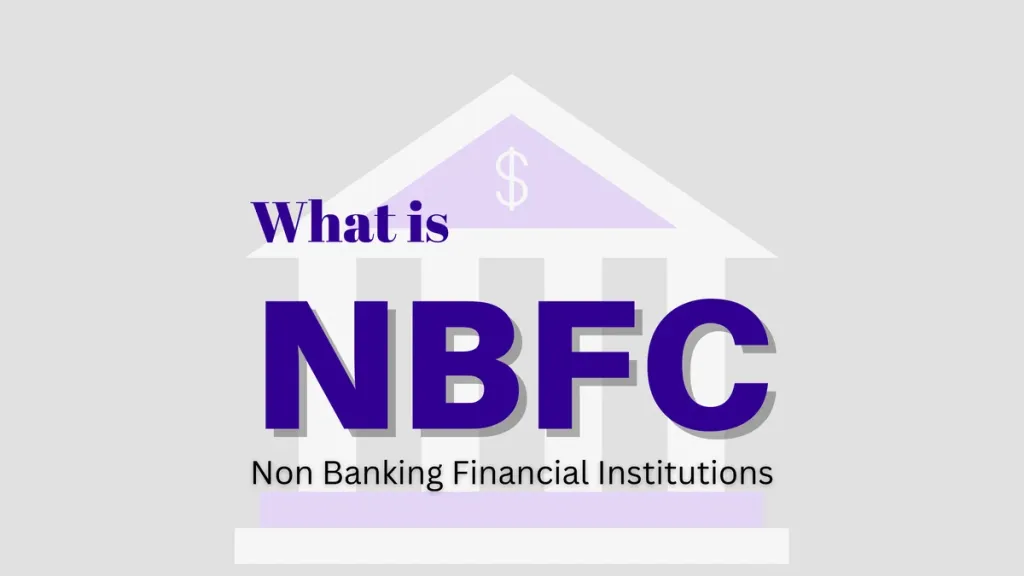What is a Non-Banking Financial Company? How do they Work?

Non-Banking Financial Company (NBFC) is a type of financial institution which engages principally in providing banking and other financial services to small businesses and individual consumers. They are also known as Non-Banking Financial Institutions. NBFIs are regulated by the Reserve Bank of India. Non-Banking Financial Institutions (NBFI) refers to any kind of private financial company other than a commercial bank, agricultural credit society or cooperative society. They are generally organized as partnerships with banks, but may also be operated independently.
What is a Non-Banking Financial Company?
Non-banking financial companies (NBFCs) are private sector companies that provide banking and other financial services to businesses and individuals outside the mainstream banking system. NBFCs have been growing in importance as a source of finance for small businesses and the unbanked, and many now offer a full range of products, including credit, capital markets, insurance, and wealth management. NBFIs typically have lower capitalization than traditional banks and are more susceptible to economic shocks.
NBFCs can be divided into two categories: private NBFCs and public NBFCs. Private NBFCs are owned by their own shareholders and are not government-owned or -controlled. Public NBFCs are government-owned or -controlled but are traded on stock exchanges.
The main reason for the growth of NBFIs is their ability to offer products that are not available through the mainstream banking system. For example, many NBFCs offer credit products that are not available from traditional banks. This allows small businesses and the unbanked access to financing they would otherwise not be able to get. In addition, NBFCs can offer lower interest rates on loans than traditional banks because they do not have to adhere to the high capital requirements that are imposed by the banking system.
Some of the most popular Non-Banking Financial Institutions in India are:
- Muthoot Finance Ltd
- Bajaj Finance Ltd
- HDB Finance Finance Services
- Tata Capital Financial Services Limited
- L&T Finance Limited

History of Non-Banking Financial Company
NBFCs were first founded in India in the 1960s as an option for investors and savers whose demands were not fully satisfied by the country’s then-existing banking system. The NBFCs initially had a modest operation without having a significant influence on the financial sector. They negotiated lease agreements for large industrial businesses and invited investors to invest in Fixed Deposits.
Due to their reputation for being customer-friendly, NBFCs started to draw a lot of investors between the 1980s and the 1990s. From about 7000 in 1981 to over 30000 in 1992, the number of NBFCs increased quickly, prompting the RBI to feel the need to regulate the sector. A committee led by Mr. A. C. Shah, a former chairman of the Bank of Baroda, was established by the RBI in 1992 to recommend policies for efficient industry regulation. The recommendations made by the Shah Committee included a wide range of topics, from required registration to prudential standards.
The RBI Act of 1934 underwent major amendments in January 1997. Particularly to Chapters III-B, III-C, and V. Which sought to establish a comprehensive regulatory and supervisory structure to safeguard NBFCs’ interests and guarantee their efficient operation.
The NBFCs have grown in importance and given the financial industry more depth during the past 20 years. The union cabinet approved the automatic route for foreign direct investment (FDI) in regulated NBFCs in August 2016.
Also: Read What is Equity Linked Saving Scheme- ELSS?
How are NBFCs different from a Bank?
Non-Banking Financial Institutions (NBFI) are different from a bank in terms of their business model and the way they operate. A NBFC is a company which functions as a financial intermediary between borrowers and lenders. It provides credit, debit and deposit services, as well as other financial products such as auto loans and insurance.
A NBFI is different from a bank in terms of its ownership. A bank is owned by a government or a large commercial organization, while NBFI are typically owned by private investors. This allows NBFI to provide more flexible lending options and respond more quickly to changes in the market.
In addition, NBFCs are not strictly regulated by the central bank like banks are. This allows them to offer products and services that are not available to banks. However, this also makes them less stable than banks, and they are more likely to suffer from financial crises.
How Non-Banking Financial Companies Work?
Non-Banking Financial Companies (NBFCs) and Non-Banking Financial Institutions (NBFI) are financial companies that are not part of the conventional banking system. They offer a wide range of financial products and services to customers, including credit, deposits, insurance, and other financial products. These companies have grown in importance in recent years as the banking system has become more complex and regulated.
In order to be classified as a non-banking financial company, a company must meet certain criteria. These companies typically have less than 100 branches and do not offer commercial or consumer banking services. This allows these companies to offer products and services that are not available to traditional banks.
NBFCs are an important part of the Indian economy and provide a wide range of financial products and services to consumers.
What are the Functions of a non-banking financial company?
Non-banking financial companies are a type of financial institution that provide banking and other related financial services to businesses and consumers that do not have a traditional bank account. These companies can originate and service loans, as well as offer insurance, investment products and other banking services. Non-banking financial institutions can also be involved in a number of other activities, such as underwriting and selling securities.
The primary function of a non-banking financial company is to provide banking and related financial services to businesses and consumers who don’t have traditional bank accounts. They can also originate loans, offer insurance products, and engage in other banking activities.
How are NBFCs regulated in India?

They are regulated by the Reserve Bank of India and must adhere to a set of guidelines and requirements. NBFCs typically offer consumer loans, credit products, and insurance products.
NBFCs Controversy in India
Non-Banking Financial Companies (NBFCs) or Non-Banking Financial Institutions (NBFI) are a controversial sector in India. These entities provide banking and other financial services to unorganized sectors such as small businesses, agriculture, and unincorporated enterprises. They are regulated by the Reserve Bank of India (RBI) and their deposits are protected by the Indian Deposit Insurance and Guarantee Corporation (IDIC). However, they have been criticized for their high levels of debt, which has resulted in a number of instances of bankruptcy. In 2013, the RBI introduced new regulations that aimed to improve the sector’s financial stability.
Measures by RBI
The RBI has taken certain measures to prevent this NBFCs issue from developing into a full-blown financial catastrophe. NBFCs may now more easily get capital due to changes made by the RBI to its regulations. Prior to this change, banks were limited in how many loans they could provide to NBFCs. Prior to this, banks were only permitted to lend NBFCs a maximum of 10% of their total loans. For a short period of time, this cap has been lifted to 15%. This action has already had the immediate effect of releasing close to $10 billion in liquidity to the cash-strapped NBFC sector. The RBI’s decision would make it easier for Non-Banking Financial Companies (NBFCs) to borrow funds quickly and refinance their debts. For now, the risk of defaults will be reduced.
However, the long-term viability of this approach has drawn criticism. The idea of the RBI is to utilize banks, who already have a lot of issues, to fix the NBFC issue! According to several experts, the financial industry may also be doomed.
Due to this infusion of liquidity, banks would eventually receive many non-performing assets from non-banking financial companies (NBFCs). This action might seriously hamper the banking industry’s ability to recover considering the non-performing assets crisis the Indian banking system is already experiencing.
Pros and Cons of NBFCs
Non-Banking Financial Companies (NBFCs) have emerged as an important part of the Indian financial sector. They are regulated by the Reserve Bank of India (RBI) and are allowed to provide banking services, including credit and debit cards, internet banking, and mobile banking.
The main advantage of NBFCs is that they can offer a wider range of products and services than traditional banks. This means that they can reach out to a wider customer base and offer them more choice. Another advantage is that NBFCs are typically better placed to meet the needs of rural customers, who tend to be underserved by traditional banks.
However, there are also some disadvantages associated with using NBFCs. For example, they are less stable than traditional banks and are more likely to experience liquidity problems. Additionally, NBFCs tend to be more expensive than traditional banks, which may not be suitable for everyone.









